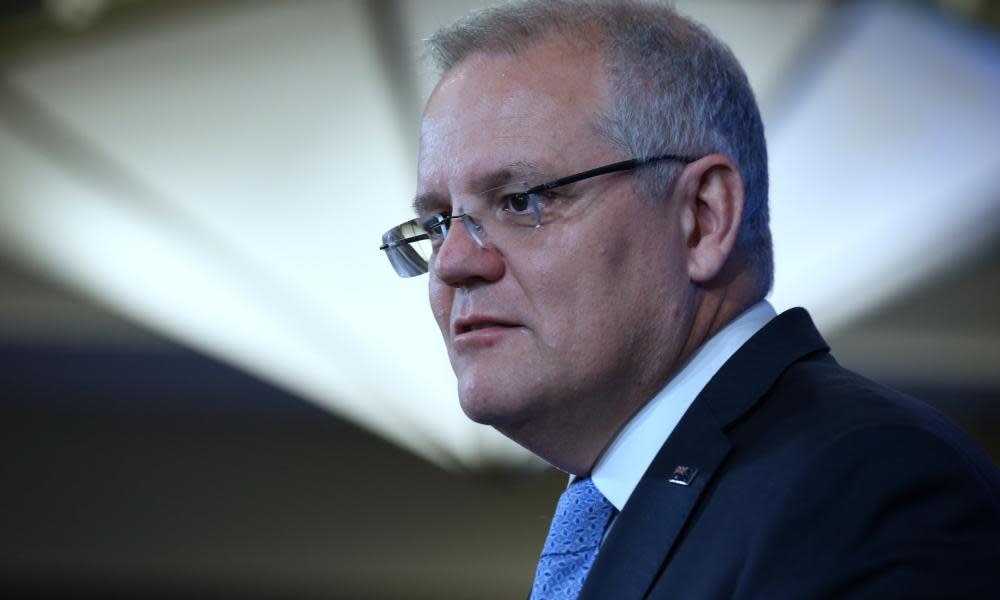Scott Morrison to announce $3.8bn infrastructure stimulus package

The prime minister, Scott Morrison, will announce a $3.8bn infrastructure stimulus package on Wednesday, saying the government will support jobs and investment as the economy faces global uncertainty without succumbing to “panic”.
Following calls from Labor, the International Monetary Fund and the Reserve Bank for the government to provide more fiscal stimulus amid slowing growth and record low interest rates, Morrison will use a major speech to the Business Council of Australia to outline how the government will “practically and soberly” support growth in the current economic climate.
“Australia has an undiminished capacity to grow our economy and succeed in today’s global environment and … achieving this growth remains our priority task,” he is expected to say.
Related: Australia's overseas aid set for shake-up as Pacific power balance shifts
The prime minister is expected to contrast the Coalition’s remedy for economic support with Labor’s response to the global financial crisis under Kevin Rudd, saying the government is focused on structural reform rather than a “desperate, one off, short-term sugar hit”.
“If Australians wanted to elect economic panic merchants, they would have voted Labor,” Morrison is expected to say, according to draft extracts of the speech.
“A panicked reaction to contemporary challenges would amount to a serious misdiagnosis of our economic situation.”
Dismissing a popular “appetite for crisis”, Morrison will say that there is an “immaturity” in Labor’s demand for urgent action regardless of the consequences.
“If there is a crisis, you don’t need to dot your i’s and cross your t’s. Urgency takes over reason. What you get is the fiscal debacle that was rendered by the Rudd-Gillard-Rudd Labor government that we are still paying for to this day, and that Labor continues to promote. We will not be following Labor’s example or policy prescriptions.
“A responsible and sensible government does not run the country as if it is constantly at DEFCON1 the whole time, whether on the economy or any other issue – it deals with issues practically and soberly.”
The infrastructure announcement will see the government commit to an extra $3.8bn worth of infrastructure spending over the next four years.
Over the next 18 months, this will comprise $1.27bn in fast-tracked funding along with $510m in new money, while over the forward estimates the amount brought forward will total $2.72bn, with $1.06bn in new money.
Morrison will say the infrastructure spend will support the economy in two ways – by creating construction activity and jobs in the near term, and by reaping longer run productivity gains.
The prime minister is also expected to outline details of the first stage of the government’s deregulation agenda, which has been led by the assistant minister to the prime minister, Ben Morton.
“Our government will foster the stability and certainty necessary in both our political and economic systems to support jobs, grow our economy, protect our environment, deliver world class services and enable individual Australians and their families to plan for their future with confidence,” Morrison will say.
“They’ve had enough of the drama.”
The infrastructure plan will include spending in every state and territory, with the government planning to announce details of transport projects in Queensland and Western Australia this week. On Monday, Morrison announced a $415m package with the South Australian government.
The states will be expected to stump up additional cash as part of the infrastructure deal, with urban projects usually funded on a 50-50 split, while regional projects have a 20% state contribution.
Related: Michael McCormack defends regional grants, saying he is 'happy to stand beside' all projects
Arguing the economy remains in good shape with jobs growth expected to remain “solid”, Morrison will also talk up the stimulatory impact of the government’s tax cut package, saying the $19.5bn package was the nominal fiscal equivalent over the forward estimates of almost the entire once-off cash payment stimulus provided under the Rudd Government.
He will also reaffirm the government’s commitment to returning the budget to surplus, saying it will be the product of “difficult and disciplined choices over six successive Coalition budgets”.
But he will say that global uncertainty and the impact of prolonged drought were being felt across the economy, with farm GDP declining by 8.3% over the past year. “Notwithstanding these headwinds, our economy has continued to grow.”
He says the government will achieve budget surpluses “on average” over the economic cycle, while ramping up spending on health, education, disability services and aged care.
“That’s the dividend of responsible economic management,” he will say.

 Yahoo News
Yahoo News 
